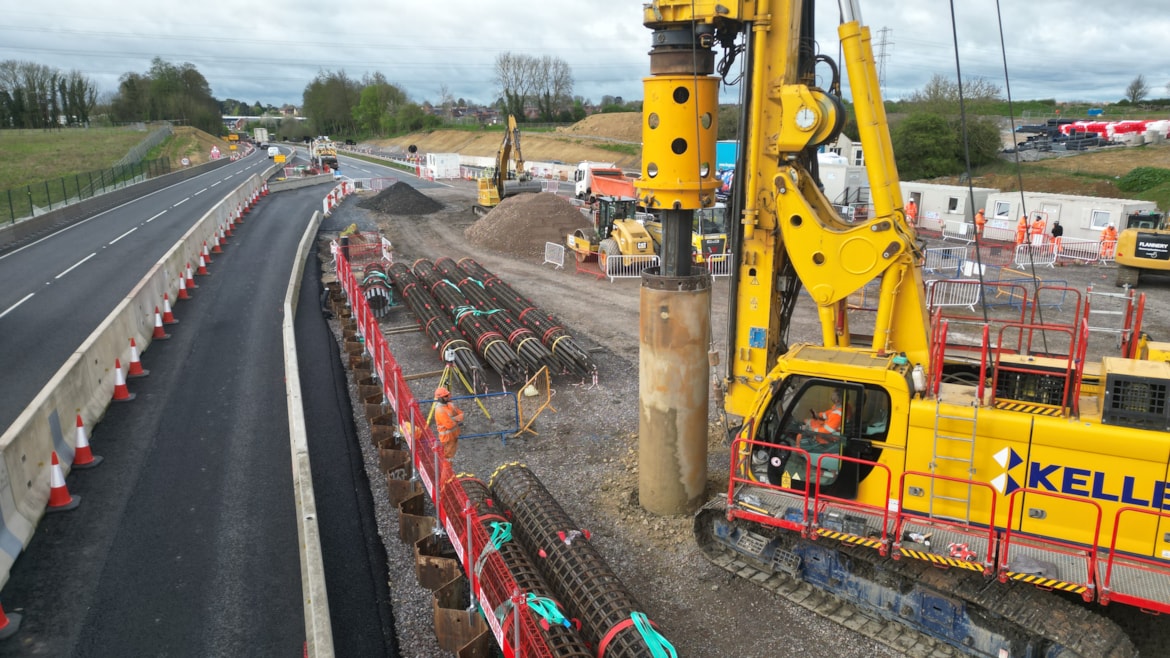HS2 has begun foundation works for a key bridge that will take a major A road over the new high-speed railway just outside Brackley, after successfully completing the temporarily realignment of both carriageways.
The A43 – which links Oxford, Brackley and Northampton – is a vital route, providing access to Silverstone and connections between the M40 and M1.
Just two weekend closures were needed during the seven-month realignment project, with HS2 working closely with National Highways to create an ‘island’ between the two carriageways big enough for the construction of the new bridge deck.
HS2 engineers have now begun work on the 52m deep piled foundation that will support the weight of the bridge. These will be topped with concrete pile caps and piers supporting the 66-metre-long bridge deck that will carry the road.
Once the deck has been completed, the road will be moved back over the new bridge and excavation can begin to create space for the railway to pass underneath. This multi-stage approach was designed to keep traffic flowing and reduce disruption.
HS2’s Senior Project Manager Elizabeth Longinotti said:
“It’s great to see the start of foundation works for the A43 overbridge. Once complete, HS2 will boost connections between Britain’s two largest cities while freeing up space for more local services on the existing network. But it’s also vital that we keep the local routes which people depend on open while we build the railway.
“That’s why we’ve worked closely with National Highway and our contractors to design and deliver a complex multi-stage project which will keep disruption to a minimum while we deliver this key overbridge.”
The almost 80km stretch of railway that passes Brackley – including the A43 bridge – is being delivered by HS2’s main works contractor EKFB, a team made up of Eiffage, Kier, Ferrovial Construction and BAM Nuttall – working with ASC (a joint venture between Arcadis, Setec and COWI).
They worked with National Highways and EKFS’s sub-contractor, Kier Highways, to construct the temporary realignment over a seven-month period last year.
National Highways Network Planner for the East Midlands, Phil Shaw, said:
“We always strive to minimise disruption for people using our roads when any work is being carried out and have liaised closely with our HS2 partners to do so on this complex project.
“Working together we have not only been able to limit the impact on drivers of building the overbridge but have also been able to take advantage of any road closures to carry out some routine maintenance work which means we won’t have to come back and close the road another time.”
EKFB’s Project Director, Tony Wehby, said:
“EKFB’s priority was to minimise disruption for local road users and to keep communities connected as best as possible. The road closures were minimised to short periods and often overnight.
“The team is thrilled to be at this point in the construction programme and the start of piling works signifies outstanding team collaboration to get it to this stage. This a complex set of works and is a unique construction project in itself, that heavily leans on the expertise of the multiple contractors involved in delivering these works to a high and safe standard.”
The A43 is one of around 500 bridges on the HS2 project – which is designed to improve connections between London, Birmingham and the North while freeing up space for more local trains on the most congested southern end of the existing West Coast Main Line into London Euston.
These range from small footbridges and underpasses, to innovative ‘green bridges’ designed to help wildlife cross the railway, massive motorway bridges and the record-breaking Colne Valley Viaduct.
The last few months has also seen significant progress at HS2’s other major viaducts, with the first deck slide for the enormous Delta Junction over the A42/M6 link road outside Birmingham and the start of a half-kilometre deck slide at Wendover Dean.
Route wide, HS2 is now at peak construction, with 28,000 people employed directly and across the UK-wide supply chain.

